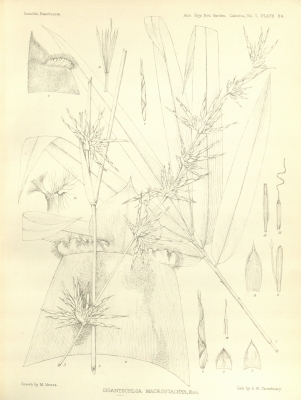Gigantochloa macrostachya
Kurz
Poaceae
Bambusa macrostachya Kurz
Gigantochloa kachinensis E.G.Camus
Gigantochloa kathaensis E.G.Camus
Gigantochloa mogaungensis E.G.Camus
Gigantochloa tekserah E.G.Camus
Gigantochloa toungooensis E.G.Camus
Gigantochloa wanet E.G.Camus
Gigantochloa wunthoensis E.G.Camus
Gigantochloa yunzalinensis E.G.Camus
Oxytenanthera macrostachya Brandis
Common Name:
General Information
Gigantochloa macrostachya is an evergreen, perennial, clump-forming bamboo growing 10 - 16 metres tall. The thin-walled, erect, woody culms are 6 - 10mm in diameter with internodes 40 - 80cm long.
The plant is harvested from the wild for local use as a source of materials.
Known Hazards
None known
Botanical References
633- Title
- Annals of the Royal Botanic Garden, Calcutta. Vol. 7
- Publication
-
- Author
- Gamble J.S.
- Website
- http://www.biodiversitylibrary.org
- Publisher
- Bengal Secretariat Press; Calcutta.
- Year
- 1896
- ISBN
-
- Description
- A very comprehensive listing of the bamboos of India, as they were known at the end of the 19th Century. Includes some information on plant uses. It can be downloaded from the Internet.
Range
E. Asia - northeast India, Bangladesh, Myanmar.
Habitat
Not known
Properties
| Other Uses Rating |      |
| Habit | Evergreen Bamboo |
| Height | 13.00 m |
| Pollinators | Wind |
| Cultivation Status | Wild |
Cultivation Details
Bamboos have an interesting method of growth. Each plant produces a number of new stems annually - these stems grow to their maximum height in their first year of growth, subsequent growth in the stem being limited to the production of new side branches and leaves. In the case of some mature tropical species the new stem could be as much as 30 metres tall, with daily increases in height of 30cm or more during their peak growth time. This makes them some of the fastest-growing species in the world[
K- Title
- Plants for a Future
- Author
- Ken Fern
- Description
- Notes from observations, tasting etc at Plants For A Future and on field trips.
].
Bamboos in general are usually monocarpic, living for many years before flowering, then flowering and seeding profusely for a period of 1 - 3 years before usually dying. Bamboos in general are usually monocarpic, living for many years before flowering, then flowering and seeding profusely for a period of 1 - 3 years before usually dying. This pattern can vary - sometimes flowering is sporadic, with plants flowering annually and not dying; at other times it is gregarious with all the plants in a specific species coming into flower at the same time. Gregarious flowering of this species has been ovserved, but the only record we can find was in 1862[
361- Title
- Bamboos of India: A Compendium
- Publication
-
- Author
- Seethalakshmi K.K., Muktesh Kumar M.S.
- Website
- http://www.inbar.int/publication/txt/tr17/default.htm
- Publisher
- Brill.
- Year
- 2002
- ISBN
- 8186247254
- Description
- A very good book giving botanical descriptions of the plants with brief notes on subjects such as uses, habitat and range. It is also available to view on the Internet.
].
Edible Uses
None known
Medicinal
None known
Other Uses
The culms are used for construction and are split for making baskets, mats etc[
361- Title
- Bamboos of India: A Compendium
- Publication
-
- Author
- Seethalakshmi K.K., Muktesh Kumar M.S.
- Website
- http://www.inbar.int/publication/txt/tr17/default.htm
- Publisher
- Brill.
- Year
- 2002
- ISBN
- 8186247254
- Description
- A very good book giving botanical descriptions of the plants with brief notes on subjects such as uses, habitat and range. It is also available to view on the Internet.
].
Propagation
Seed -
If you have any useful information about this plant, please leave a comment. Comments have to be approved before they are shown here.


 Useful Tropical Plants Database 2014 by
Ken Fern,
web interface by
Ajna Fern
with help from
Richard Morris.
Useful Tropical Plants Database 2014 by
Ken Fern,
web interface by
Ajna Fern
with help from
Richard Morris.